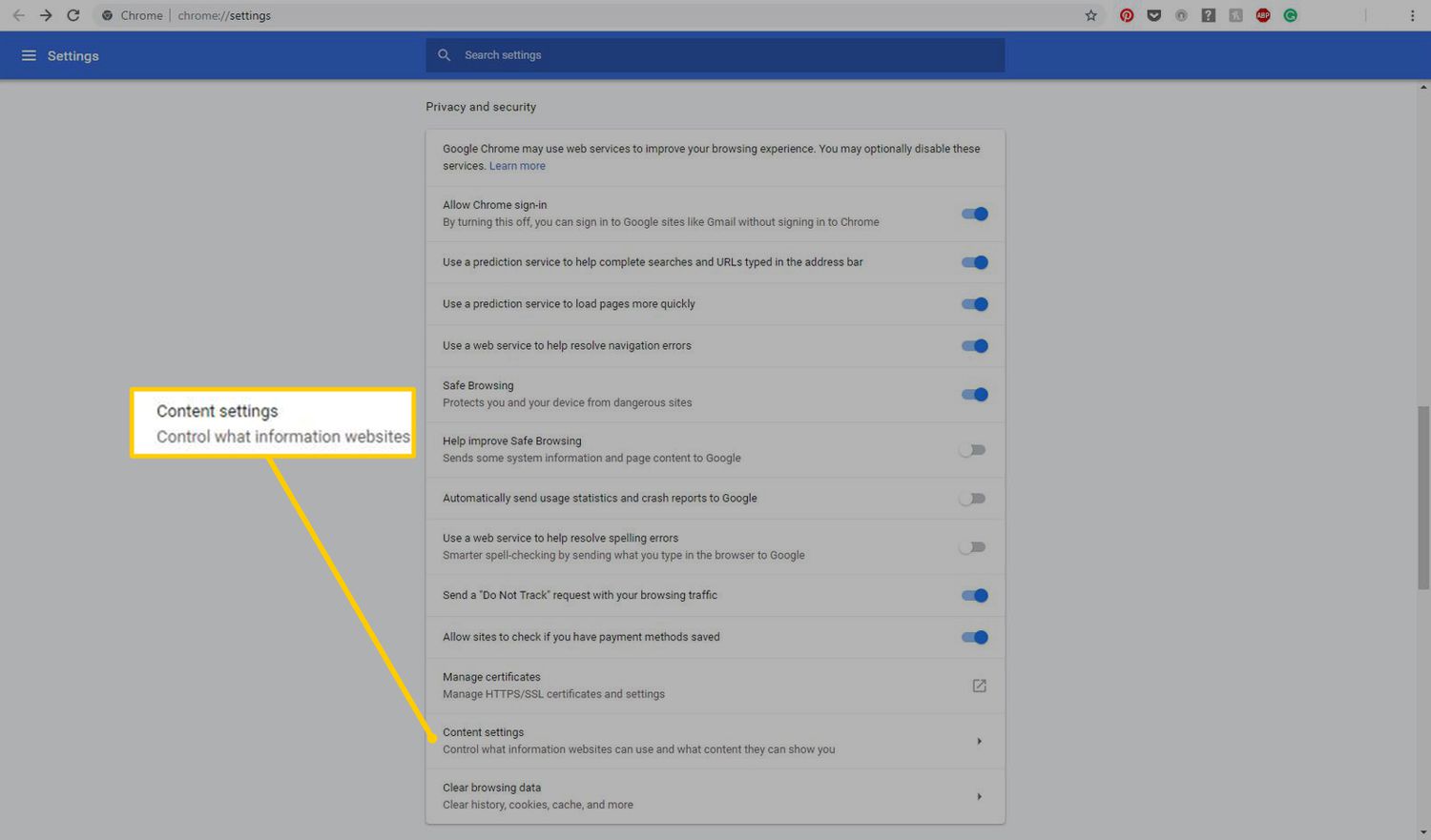Introduction
In today's fast-paced digital age, web browsing has become an integral part of our daily lives. Whether it's for work, entertainment, or staying connected with the world, the speed and efficiency of our web browsers play a crucial role in our online experience. One of the key aspects that can significantly impact browsing speed is the download process. Waiting for downloads to complete can be frustrating, especially when time is of the essence.
Fortunately, there are several strategies and techniques that can be employed to expedite the download process and enhance overall browsing performance. From optimizing browser settings to utilizing specialized tools, there are various avenues to explore in the quest for faster downloads. By implementing these methods, users can streamline their browsing experience and minimize the waiting time associated with downloading files, documents, and media.
In this comprehensive guide, we will delve into the various approaches that can be employed to accelerate browser downloads. From clearing browser cache and disabling extensions to leveraging download managers and optimizing network settings, we will explore a range of practical solutions to enhance download speed. Additionally, we will discuss the importance of keeping browsers updated and the potential benefits of switching to a different browser.
By the end of this guide, readers will have a deeper understanding of the factors that influence download speed and the actionable steps they can take to optimize their browsing experience. Whether it's shaving off valuable seconds from download times or ensuring a smoother overall browsing experience, the insights shared in this guide are geared towards empowering users to make the most of their web browsing activities. So, let's embark on this journey to unlock the secrets of expediting browser downloads and maximizing online efficiency.
Clearing Browser Cache
Clearing the browser cache is a fundamental step in optimizing download speed and overall browsing performance. The cache is a storage area within the browser that retains copies of web pages, images, and other resources as a means of accelerating subsequent access to the same content. While this mechanism is designed to enhance efficiency, an overloaded or outdated cache can have the opposite effect, leading to sluggish download speeds and a less responsive browsing experience.
When the cache becomes cluttered with a multitude of temporary files and outdated resources, it can impede the browser's ability to swiftly retrieve and process new content. As a result, clearing the cache at regular intervals is essential to ensure that the browser operates at peak performance levels.
By clearing the cache, users can effectively purge the accumulated clutter and pave the way for faster downloads. This process involves removing temporary files, cookies, and cached images, thereby creating a clean slate for the browser to fetch and store new content. Additionally, clearing the cache can address issues related to corrupted or outdated files, which may have been hindering the download process.
To clear the cache, users can typically access the browser's settings or preferences menu, where they will find the option to clear browsing data. This feature allows users to select the specific types of data they wish to remove, such as cached images and files, cookies, and browsing history. Once the cache is cleared, the browser will be primed to deliver improved download speeds and a more responsive browsing experience.
In essence, clearing the browser cache serves as a proactive measure to declutter the digital workspace and optimize the browser's performance. By incorporating this simple yet impactful practice into their browsing routine, users can pave the way for swifter downloads and a more efficient online experience.
Disabling Browser Extensions
Browser extensions, also known as add-ons or plugins, are additional software components that enhance the functionality of web browsers by offering a wide range of features and capabilities. While these extensions can be valuable assets in customizing the browsing experience, they can also exert a significant impact on download speed and overall browser performance.
When multiple extensions are active within a browser, they consume system resources and may introduce additional processes that compete for bandwidth and processing power. This can lead to a slowdown in download speeds and an overall reduction in browsing efficiency. Therefore, disabling or managing browser extensions is a crucial step in optimizing the download process.
To disable browser extensions, users can navigate to the browser's settings or extensions menu, where they will find a list of installed extensions along with the option to enable or disable them. By deactivating unnecessary or resource-intensive extensions, users can alleviate the strain on system resources, potentially leading to improved download speeds.
It is important to identify and evaluate the necessity of each installed extension, considering whether its functionality significantly contributes to the browsing experience. Extensions that are rarely used or have minimal impact on daily browsing activities can be disabled to streamline the browser's performance.
Furthermore, some extensions may actively monitor and analyze web traffic, which can introduce additional latency to the download process. By disabling such extensions, users can mitigate potential bottlenecks and create a more direct pathway for downloads to occur.
In some cases, conflicts between multiple extensions can arise, leading to compatibility issues and performance degradation. By selectively disabling extensions and observing the impact on download speeds, users can pinpoint any problematic extensions and take appropriate action to rectify the situation.
In essence, the process of disabling browser extensions is a strategic approach to optimizing the browser's resource allocation and streamlining its functionality. By carefully managing the roster of active extensions, users can create an environment that is conducive to faster downloads and a more responsive browsing experience.
Using a Download Manager
Introducing a download manager into the browsing toolkit can significantly elevate the efficiency and speed of downloading files from the internet. A download manager is a specialized software tool designed to optimize the download process by offering a range of features that surpass the capabilities of standard browser-based downloads.
One of the key advantages of using a download manager is its ability to segment files into multiple concurrent connections, thereby accelerating the download speed. By dividing a file into smaller segments and downloading them simultaneously, a download manager can harness the full potential of available bandwidth, resulting in faster and more efficient downloads.
Furthermore, download managers often support the resumption of interrupted downloads, a feature that can be invaluable when dealing with large files or unstable internet connections. In the event of a network disruption or a paused download, the download manager can seamlessly resume the download from where it left off, sparing users the frustration of restarting the entire process.
Another notable feature of download managers is their capacity to prioritize and schedule downloads based on user-defined preferences. This level of control allows users to allocate bandwidth to critical downloads while queuing up less time-sensitive tasks, thereby optimizing the overall download workflow.
Moreover, download managers often offer advanced file management capabilities, allowing users to categorize, organize, and track downloaded files with ease. This can be particularly beneficial for users who frequently download a wide variety of content and need a streamlined approach to managing their downloads.
In addition to these features, download managers may also provide enhanced security measures, such as the ability to scan downloaded files for malware or viruses before they are opened or executed. This proactive approach to security can safeguard users against potential threats lurking within downloaded content.
Overall, the integration of a download manager into the browsing arsenal presents a compelling opportunity to elevate the download experience. By harnessing advanced download optimization techniques and offering a suite of valuable features, download managers empower users to expedite downloads, manage files efficiently, and enhance the overall browsing experience.
Updating Browser and Network Settings
Ensuring that both browser and network settings are up to date is a pivotal step in optimizing the download process and enhancing overall browsing performance. Browser updates often include critical improvements to download functionality, security enhancements, and performance optimizations, making it essential to stay current with the latest versions.
When browsers are outdated, they may exhibit inefficiencies in handling downloads, leading to slower speeds and potential compatibility issues with modern web content. By regularly updating the browser to the latest version, users can benefit from enhanced download capabilities, improved stability, and better overall performance.
In addition to browser updates, optimizing network settings can have a profound impact on download speed. Network settings encompass a wide array of configurations, including DNS settings, proxy configurations, and bandwidth allocation. By fine-tuning these settings, users can potentially unlock additional bandwidth and reduce latency, resulting in faster and more responsive downloads.
Furthermore, updating network drivers and firmware for networking hardware, such as routers and modems, can contribute to a more efficient data transfer process. Outdated drivers or firmware may hinder the network's ability to deliver data at optimal speeds, so ensuring that these components are updated can lead to tangible improvements in download performance.
It is also important to consider the impact of network congestion and bandwidth allocation on download speeds. In environments where multiple devices compete for bandwidth, optimizing Quality of Service (QoS) settings on the network router can prioritize and allocate bandwidth for critical activities such as downloads, thereby enhancing the overall download experience.
Moreover, leveraging browser-specific network optimizations, such as enabling parallel connections for downloads or adjusting buffer settings, can further enhance download speeds. These optimizations are often accessible through advanced browser settings or developer tools, allowing users to fine-tune the browser's behavior to maximize download performance.
In essence, updating both browser and network settings is a proactive approach to ensuring that the digital infrastructure supporting the browsing experience is finely tuned for optimal performance. By staying abreast of the latest browser updates and optimizing network configurations, users can pave the way for faster downloads, improved stability, and a more seamless browsing experience.
Using a Different Browser
Exploring the option of using a different web browser can be a strategic move to potentially enhance download speed and overall browsing efficiency. While many users have their preferred browser for daily activities, it's important to recognize that different browsers are engineered with varying architectures and optimization strategies, which can directly impact download performance.
When contemplating a switch to a different browser, it's essential to consider the diverse range of features and performance optimizations that each browser offers. For instance, some browsers may excel in handling multiple concurrent downloads, while others may prioritize resource efficiency and streamlined data processing. By evaluating the unique strengths of alternative browsers, users can identify a platform that aligns with their specific download requirements and browsing preferences.
Moreover, different browsers may exhibit varying levels of compatibility with websites and web-based applications, which can influence the speed and reliability of downloads. Certain browsers may leverage advanced caching mechanisms, rendering engines, or network protocols that optimize the delivery of content, resulting in faster and more responsive downloads. By exploring alternative browsers, users can gain insights into the diverse approaches to handling web content and the potential impact on download performance.
Furthermore, the ecosystem of browser extensions and add-ons available for different browsers can play a significant role in enhancing the download experience. Some browsers may offer a rich selection of extensions that cater to download management, bandwidth optimization, and security enhancements, providing users with a comprehensive toolkit to streamline their download workflow. By leveraging the unique capabilities of alternative browsers and their associated extensions, users can potentially unlock new avenues for accelerating downloads and improving overall browsing efficiency.
In addition to performance considerations, the security and privacy features embedded within different browsers can influence the safety and integrity of downloaded content. Certain browsers may employ robust security measures, such as built-in malware protection, secure download protocols, and privacy-focused features, which can safeguard users against potential threats lurking within downloaded files. By embracing a browser that prioritizes security and privacy, users can mitigate risks associated with malicious downloads and ensure a safer browsing experience.
In essence, exploring the option of using a different browser presents an opportunity to gain fresh perspectives on download speed, performance optimizations, and security enhancements. By evaluating the unique attributes of alternative browsers and their potential impact on the download experience, users can make informed decisions to elevate their browsing efficiency and streamline the process of accessing and managing downloaded content.
Conclusion
In the quest for faster browser downloads, users are presented with a diverse array of strategies and techniques to optimize their browsing experience. From clearing the browser cache and disabling resource-intensive extensions to leveraging advanced download managers and fine-tuning network settings, the journey towards expediting downloads is marked by a wealth of actionable insights and practical solutions.
By incorporating the practice of clearing the browser cache into their routine, users can proactively declutter the digital workspace and pave the way for swifter downloads. This fundamental step serves as a catalyst for optimizing the browser's performance and ensuring a more responsive browsing experience.
Furthermore, the strategic approach of disabling browser extensions empowers users to streamline the browser's functionality and alleviate the strain on system resources. By carefully managing the roster of active extensions, users can create an environment that is conducive to faster downloads and a more efficient browsing experience.
Introducing a download manager into the browsing toolkit presents a compelling opportunity to elevate the download experience. By harnessing advanced download optimization techniques and offering a suite of valuable features, download managers empower users to expedite downloads, manage files efficiently, and enhance the overall browsing experience.
Ensuring that both browser and network settings are up to date is a pivotal step in optimizing the download process and enhancing overall browsing performance. By staying abreast of the latest browser updates and optimizing network configurations, users can pave the way for faster downloads, improved stability, and a more seamless browsing experience.
Exploring the option of using a different web browser can be a strategic move to potentially enhance download speed and overall browsing efficiency. By evaluating the unique strengths of alternative browsers and their associated extensions, users can potentially unlock new avenues for accelerating downloads and improving overall browsing efficiency.
In conclusion, the journey to expedite browser downloads is marked by a combination of proactive measures, strategic optimizations, and the exploration of alternative tools and platforms. By embracing these insights and integrating them into their browsing routine, users can unlock the secrets of expediting downloads and maximizing their online efficiency. Whether it's shaving off valuable seconds from download times or ensuring a smoother overall browsing experience, the strategies shared in this guide are geared towards empowering users to make the most of their web browsing activities.

























